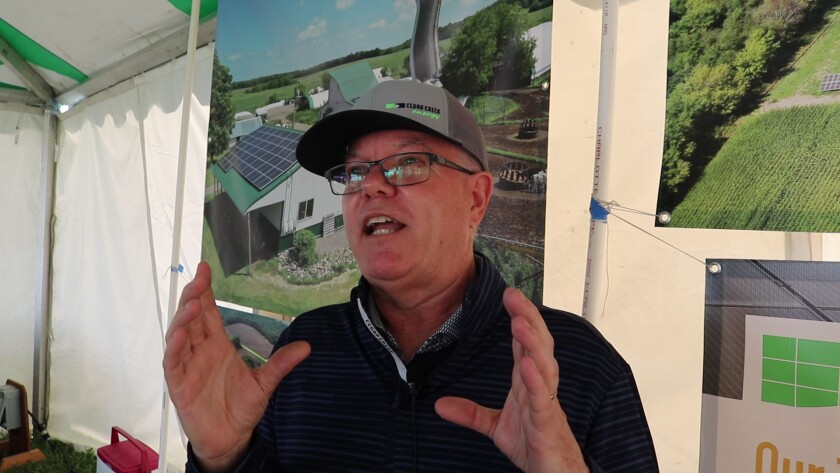Rick Tisdale, senior project development engineer for Cedar Creek Energy, has a pulse on the solar industry.
Cedar Creek Energy, a Minnesota-based solar energy company that designs, installs and maintains solar systems, has grown substantially in the 17 years it's been in business. Tisdale has been with the company for 15 of those.
ADVERTISEMENT
"When I started, we had six employees, and now we're up to over 100," Tisdsale said at Minnesota Farmfest, where the company was putting on presentations for interested attendees.
The solar business wasn't always booming. Tisdale said that a decade ago, the price of solar was "very expensive" and to offset the cost of selling solar, Cedar Creek Energy became an energy efficiency partner for Xcel Energy and showed businesses how to reduce their energy costs. As the price of solar came down, Cedar Creek Energy ramped up its solar installations.

"Farmers were actually very early adapters of solar, and they actually helped drive the price of solar down," Tisdale said.
Tisdale has a degree in aerospace engineering, AKA rocket science, and jokes to clients that if he can't get their deal to fly, no one can. He worked for a few engineering companies and then in the finance business, where he said his outgoing personality wasn't a good fit. He turned both those specialties into a career in solar.
"Solar is a really good fit for my talents, because I understand how it works from a financial standpoint," he said.
Tisdale's advice for people looking into solar is to talk to more than one company before making a decision.
"It's a big investment, and unlike a truck, if you buy a truck and you don't like it, you just trade it in and get a different brand or whatever," he said. "Solar has a warranty on it for 30 years. You're picking a dance partner you're gonna have for probably the next 30 years, and you're not buying another one most likely in your lifetime."
ADVERTISEMENT
Tisdale recommends following up on these items when reaching out to solar companies:
Tax incentives
Roughly 30% of a solar installation can be deducted from a property owner's tax liability, according to Tisdale. A property owner can also claim state and federal depreciation, therefore around 70% of a project could come back to the property owner in the form of a tax reduction.
"Reading the tax code is not that obvious," Tisdale said. "When they hear how it works in words it becomes very attractive to farmers and business owners. More than just looking at a cashflow, it also helps them to get over the hurdle that solar is expensive."
PACE
Property Assessed Clean Energy — or PACE — is a financing option that helps property owners pay for energy efficiency and renewable energy projects on their properties. PACE is available on both commercial and residential properties and can be used to finance projects such as solar panels. Currently, PACE programs are available in 32 states including Minnesota and Wisconsin.
"Over $5 billion in projects have been completed in the USA," Tisdale said of PACE. "It is basically a loan but there are not fees, no prepayment penalties, no personal guarantees by the farmer and it doesn’t show up on their credit report as a debt. They could use it for things like solar or more energy efficient dryers, etc. Anything that is an energy improvement. It is a cool program, and I did the first one in the city of Minneapolis 12 years ago."
REAP Grants
— is a federally funded grant and loan program run by the U.S. Department of Agriculture that helps farmers and rural small business owners access renewable and efficient energy technologies.
In the past year, Tisdale was able to secure three REAP grants for $1 million.









